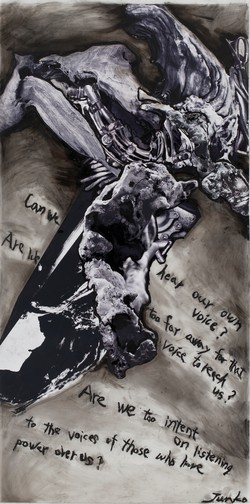Mixed media featured in 'Junko Chodos: Can We Hear Our Own Voice?'
January 12, 2018
 "Junko Chodos: Can We Hear Our Own Voice?" features mixed media pieces and drawings and will show from Jan. 25 through March 25 in The Cole Art Center @ The Old Opera House. A reception with the artist is from 6 to 8 p.m. Saturday, Jan. 27.
"Junko Chodos: Can We Hear Our Own Voice?" features mixed media pieces and drawings and will show from Jan. 25 through March 25 in The Cole Art Center @ The Old Opera House. A reception with the artist is from 6 to 8 p.m. Saturday, Jan. 27.
"Junko Chodos: Can We Hear Our Own Voice?" features mixed media pieces and drawings. The artist considers herself "a hypermodern mystic," and she describes much of her work as "centripetal" in nature.
"It refers to art created by an artist who strives towards her center and encounters 'Divine Presence' there, where people go beyond the barriers of ethnicity, gender, religious denominations, dogma, and confined ideas of blood and soil," she writes. "For such an artist, the process of creating art itself is a spiritual journey on which every step must be taken with honesty, with discipline and with courage.
"When the artist's journey is successful, the viewer participates in it and starts out on his or her own journey," she said. "Then the process of creating art and the process of viewing art becomes one, and the transcendence that the artist reaches becomes the viewer's own transcendence."
Her large-scale pieces are titled "Lift the Curtain Series."
"These pieces deal with the boundary between the outer world and the inner world," she said. "As their title implies, they require us to have the courage to look behind the curtain which we take for granted as something that separates these two worlds.
"The images of this series came to me as strong demands," she said. "It can be said that they came as a Revelation, or if you feel more comfortable using (Carl) Jung's words, they came from the collective unconscious - from a place far deeper than the personal unconscious. They came as a shock to me: they flooded onto me, they made me sway, one image after another continuing through all the works in that series, demanding my response."
John Handley, director of SFA Art Galleries, first encountered Junko's work while he was at The University of California, Berkley. He said he was immediately attracted to it on many levels: "the abstraction, expressiveness and immediacy of the work, touching on emotional turmoil, hope, fear, spirituality and transcendence."
"I've continued to watch her career and was really taken by the body of work selected for this exhibition," he said. "This is not your typical art; it embodies so much about the artist's life and journey, and I believe the show will inspire artists from all media to think in broader terms about creativity."
This is the first public exhibition in which these works are being displayed. However many of the artist's friends - composers and other artists - have come to her studio to see them and have said that they could not stop crying, and that they consider these works to be "an important message to our generation," she said.
The artist will discuss her work, specifically where her art fits into the course of art history, at a reception from 6 to 8 p.m. Saturday, Jan. 27, at Cole Art Center. The reception is sponsored in part by the Friends of the Visual Arts, Nacogdoches Junior Forum and The Flower Shop.
Junko Takahashi was born in 1939 in Tokyo, Japan. Her experience during World War II affected her later in life and in her art. She grew up in a household where Shinto, Buddhism and Christianity were strong influences. She was a member of the first post-war generation of "commoners" allowed to attend the prestigious Gakushuin, the "Imperial school."
She enrolled at Tokyo's Waseda University, graduating in 1968 with a bachelor's degree in art history and philosophy. In 1968, she migrated to California, calling herself a "spiritual refugee." She attended the State University of New York, Buffalo. In 1971, she married Rafael Chodos, a lawyer and author in biblical studies and the aesthetics of fine art.
She has been creating art professionally since the early 1970s and has produced more than 1,000 works in a variety of media and techniques, many of which she invented.
For more information, call (936) 468-1131.